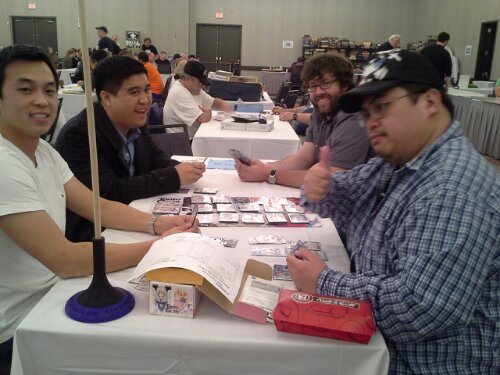Mike and I went back to Strategicon this weekend for Gamex (OrcCon is in February, Gamex is May, and Gateway is on Labor Day weekend). I previously wrote a round-up of our gaming experiences, so decided to do so again this week.
We both played the same system more than once this weekend– I played Fate and Dungeon World, while Mike spent a day at Pathfinder. I’ve written about my enjoyment of Dungeon World and Fate before, and you know that I’m starting a Fate campaign called the Arco soon.
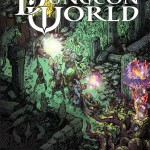 My experiences this weekend with a more traditional Dungeon World setting (Ravenloft) was  that Dungeon World’s magic system (I played a cleric) is a little weak. It requires a move in order to use it, and once you fail or complicate your spellcasting, you might be at -1 to cast until the next day. Additionally, you’re at a -1 to cast if you are maintaining an ongoing spell effect (like invisibility). And that goes for 0-level spells like “light.” It’s hard enough to get a 10+ on any move in DW. To make it harder and harder throughout the day is just… it’s rough. My main role in the party ended up being “I’ll hold them off” when the undead crowded in on us– and I pretty much had to do that over and over and over, because there’s no ongoing penalty for doing it, and I was capable enough at it. I’m not sure if there’s a good fix for this, and I mentioned in a post in the Dungeon World Google+ group that I realize I may simply be looking at it the wrong way. In any case– the simple fact is, at some point, I want to feel heroic, and it was difficult to do that. Side note: When your dice pretty much screw you over in every session you play in a weekend where you play 7 different RPG games… well, eventually you really want to be successful at something.
My experiences this weekend with a more traditional Dungeon World setting (Ravenloft) was  that Dungeon World’s magic system (I played a cleric) is a little weak. It requires a move in order to use it, and once you fail or complicate your spellcasting, you might be at -1 to cast until the next day. Additionally, you’re at a -1 to cast if you are maintaining an ongoing spell effect (like invisibility). And that goes for 0-level spells like “light.” It’s hard enough to get a 10+ on any move in DW. To make it harder and harder throughout the day is just… it’s rough. My main role in the party ended up being “I’ll hold them off” when the undead crowded in on us– and I pretty much had to do that over and over and over, because there’s no ongoing penalty for doing it, and I was capable enough at it. I’m not sure if there’s a good fix for this, and I mentioned in a post in the Dungeon World Google+ group that I realize I may simply be looking at it the wrong way. In any case– the simple fact is, at some point, I want to feel heroic, and it was difficult to do that. Side note: When your dice pretty much screw you over in every session you play in a weekend where you play 7 different RPG games… well, eventually you really want to be successful at something.
This particular session was also hindered by a spotlight-hogging PC. She would take four actions to our one, and none of us could get a word in edgewise to interrupt or participate meaningfully. She was the fighter in the party, and the guy playing the paladin was pretty much “done” and ready to quite two hours into the game. I really don’t want to be all “Bad DM!” though, because one of the hardest parts of DMing is ensuring equal spotlight for all players. It’s kind of an advanced technique, and one that requires a lot of experience. So, that was one facet of the session that somewhat hindered things. Would I play with the same folks again? Absolutely, and hope it was an off night or something.
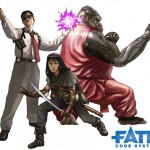 I had a similar experience with ineffective spellcasting in Fate, when I joined Mike Olson’s AD&D-callback game. Don’t get me wrong– I enjoy Mike as a DM and as a player. But it was weird stepping into a character that had been played before by someone else, especially when that player had somewhat changed the character’s concept. The original concept was a cleric of St. Cuthbert (from Greyhawk), which is a god of law and order, really. The previous player had slanted him to be more like a paladin, and the character’s aspects certainly support that style, with “Enough talk!” and “As Subtle as a Mace to the Face.”
I had a similar experience with ineffective spellcasting in Fate, when I joined Mike Olson’s AD&D-callback game. Don’t get me wrong– I enjoy Mike as a DM and as a player. But it was weird stepping into a character that had been played before by someone else, especially when that player had somewhat changed the character’s concept. The original concept was a cleric of St. Cuthbert (from Greyhawk), which is a god of law and order, really. The previous player had slanted him to be more like a paladin, and the character’s aspects certainly support that style, with “Enough talk!” and “As Subtle as a Mace to the Face.”
There isn’t a lot of room in those aspects for being the guy who stands stalwart behind everyone and casts protection and bless spells, which is a role that I envision a cleric doing well. There was the high concept of being a Votary of St Cuthbert, but I always feel weird invoking my high concept for something that is not as general as the high concept.
Mike’s spellcasting system, like Dungeon World’s, ends up being somewhat degenerative– you start with a spellcasting stat (I think he called it Virtue), which you roll against for each spell you want to cast. Spellcasting is a flat bonus– there’s no add-on for a skill or stat, so my +3 at the beginning was “it.” Also, I could only cast until my Virtue dropped to +1 (from +3), because spells require you to have a virtue of 🙂 (+2 or above) to cast– I could still cast a Bless type spell after virtue drops to 1, though. Once you have cast a spell, your Virtue goes down by 1 point. In addition, if you have an ongoing spell effect (like an aspect you’ve placed in the scene), the difficulty of casting a spell goes up by 2. So, I was able to cast one cure spell, and a sanctuary spell that the target didn’t actually benefit from. I failed to cast a few times, which was frustrating for me.
I know that Mike was trying to re-create the Vancian-style magic of 1st edition, but most clerical spells in that system didn’t require you to roll anything to use them. You don’t have to make a saving throw to cast Sanctuary, and having it up never made it harder to cast Cure Light Wounds. In fact, the whole point of Sanctuary was that you got to withdraw so you could run around the battlefield, curing your friends. With the way Mike’s system worked (if I remember it correctly, which is not a certainty), you would have a good chance of failing to heal anyone in the middle of combat. I would have had, mechanically, a -3 on that roll– mathematically, I think it may be impossible, with Virtue down to 2 because you’ve already cast a spell (sanctuary), and the difficulty being 4 normally; even if I rolled a +4, the best I can do, I would still only have a 3. Personally, I would rather see a spell stress track, in which you take stress to cast a spell, but doing so does not cause you to become less and less effective at casting until your spell stress is used up for the scene and you take a consequence related to the gods’ favor.
Because I was just not that great at actual spellcasting (and my aspects didn’t give me a whole lot of room to tap into something for a bonus or reroll), I relied mainly on my mace and shield. And my shield got vaporized towards the end of the adventure (damned space aliens)… Anyway, I tweeted Mike this morning to suggest a new aspect for this character should be “my faith is my shield.” In addition to leaving the shield as vaporized, it would also give the character a spell-oriented aspect that they could invoke when casting protection spells.
In addition, we had one party member who did not engage in combat, but did mess up the battlefield for our enemies, creating advantages for us. And one party member who…. separated from the party and ran away from each combat. It was a good example of “Fate is about being a proactive hero.” When one member of the party runs off and doesn’t help the team, everything bogged down.
The ranger and fighter, however, were great. Probably because they got to roll 2 extra dice on their primary abilities (shooting orcs and fighting with a sword and shield) and pick the best four. So… they were very combat effective, while I ran around and failed to hit bad guys, cast effective spells, or do anything but soak damage. My special power about soaking damage, though, was my ability to convert a consequence into a bonus, so I could use my own wounds to go for a nova once in a while and get a +4 (or better, if I dared to take a critical wound) on a die roll. That was useful, and did give me a cool moment at the end of the session taking out one of the aliens.
That said, it’s a Fate game, so at the heart of it, it’s not really about mechanical benefits. It’s about your role in the party and telling a fun story. For that, I was grateful to Mike for giving my character the spotlight of “this is the guy who shows up and brings everyone together for the job.” Each other PC had a little montage/spotlight moment where they were off doing something else, and at the end of their mini-conflict, I showed up to bring them into the job. When talking about advanced DM techniques, that’s one that he’s definitely mastered well.
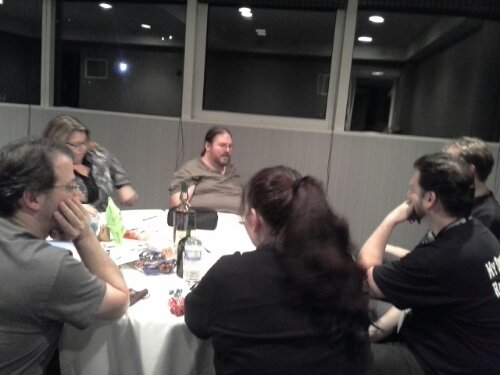 Some unique-setting games I played in were Hamish Cameron’s ΚΡΑΤΟΦΑΓΙΑ, which was this bizarre, post-apocalyptic world in which we played mutant, cannibalistic goblins that developed new and entertaining mutations whenever we succumbed to our gluttony. It was… weird. Fun, but very weird. Used the Dungeon World system, with many hacks, including a stack of cards with the random mutations on them. I did get to bring out my dice minion prop, though, which was cool. As far as gameplay, once again I had trouble being at all effective. Let’s just say that my character would have had a LOT of XP at the end of the night! (In Dungeon World, you get XP when you fail.)
Some unique-setting games I played in were Hamish Cameron’s ΚΡΑΤΟΦΑΓΙΑ, which was this bizarre, post-apocalyptic world in which we played mutant, cannibalistic goblins that developed new and entertaining mutations whenever we succumbed to our gluttony. It was… weird. Fun, but very weird. Used the Dungeon World system, with many hacks, including a stack of cards with the random mutations on them. I did get to bring out my dice minion prop, though, which was cool. As far as gameplay, once again I had trouble being at all effective. Let’s just say that my character would have had a LOT of XP at the end of the night! (In Dungeon World, you get XP when you fail.)
I also played Todd VanderWerff’s Vikings in Vikings, a Fate game, in which we were Vikings looking for a new colony, and guided by the prophetic visions of our mystic. We found a village being treated as cattle and decided we would go confront the cattle-farmers. Not because slavery is wrong, but because we’re Vikings and nobody gets to be bigger or more bad-ass than us. We found the winged monsters who were “cattle farming” and slew many of them before taking over their spaceship. Yes, spaceship.
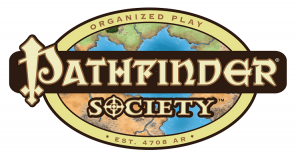
Meanwhile, my friend Mike (not Olson) played in 3 Pathfinder games– an intro series. He found the GM for the first session was “meh.” Inexperienced and unfamiliar with the module. The second two sessions were run by a very dynamic and fun GM (Kryssie), who skipped the crunchier parts of the rules in favor of more engaging role-playing. Mike had more fun at her table, I think, than anywhere else this weekend, and became far more engaged in the character he played as a result.
 Mike also played an Eclipse Phase game set in Alaska on Friday night. He said it was kind of weird, and the DM didn’t seem to have a good grasp on the mechanics of the system (first time), and wasn’t willing to handwave for the story. As a result, it bogged down quite a bit for the table. The rest of the PCs treated the adventure as a dungeon crawl, while Mike wanted to get some perspective and treat it more like a puzzle to solve.
Mike also played an Eclipse Phase game set in Alaska on Friday night. He said it was kind of weird, and the DM didn’t seem to have a good grasp on the mechanics of the system (first time), and wasn’t willing to handwave for the story. As a result, it bogged down quite a bit for the table. The rest of the PCs treated the adventure as a dungeon crawl, while Mike wanted to get some perspective and treat it more like a puzzle to solve.
 On Saturday, I popped onto a D&D Next demo game. During the rambling half hour or so at the beginning, the GM discussed other versions of D&D somewhat endlessly, then proceeded to give us various bits of misinformation on Next, like how awesome it is that they took out all that opportunity attack provoking stuff when you move. This, as she has the map set up and some minis out. I happen to know, having run games with miniatures but without AoO that it’s tactically untenable– the monsters have no reason not to run past the fighters and turn the wizard into gooshy paste.
On Saturday, I popped onto a D&D Next demo game. During the rambling half hour or so at the beginning, the GM discussed other versions of D&D somewhat endlessly, then proceeded to give us various bits of misinformation on Next, like how awesome it is that they took out all that opportunity attack provoking stuff when you move. This, as she has the map set up and some minis out. I happen to know, having run games with miniatures but without AoO that it’s tactically untenable– the monsters have no reason not to run past the fighters and turn the wizard into gooshy paste.
I pull out my Next document and search– nope. Provoking has been in the playtest documents since at least December of last year. But that’s okay– while I’m sitting there, I download the current rules and, yep. It’s in there, too.
Other rules she didn’t know:
- Add a d6 to your skill roll if you are trained in that skill.
- Your hit dice aren’t just used when you create your character. They represent your non-magical healing (3d6 means you can heal a d6 three times per day without needing a magical healer). This is extremely important, and it’s the biggest thing Next brought from 4e– healing without a cleric. One of the players specifically asked about it, and the DM had no clue.
- Cover grants a +2 or +5 to your AC. It does not grant disadvantage/advantage. That one’s kind of weird, though, since the whole focus in Next has been “you either have advantage or you don’t,” and getting rid of the scaled bonuses and such. Personally, I think cover should be you either have it or not, and it gives advantage or it doesn’t. Re-introducing a +2/+5 mechanic after simplifying it elsewise is not doing anyone any favors.
- Ray of Frost does a d8 of damage and doesn’t cost a spell slot (to be fair, this has changed in almost every playtest update).
Normally, I do not care if the GM is still learning the rules to a game at a convention. It’s great if they already know them, but I go to conventions to play and run games that I don’t get to play at home. So I totally get it if you don’t completely know the system.
However, the GM was “RPGA Staff,” which means she needs to know the rules better. Adding insult to injury, though, she took a phone call while we were setting up and was telling the person on the other end about how they were paying for her hotel room for the weekend in exchange for running/teaching/testing these games.
Er… then maybe you should actually be running the game correctly?
Anyway, I did enjoy some of the session, and I can definitely see myself running one of the old adventures in Next. I have to confess, I got excited when I realized the playtest packet has the module for Isle of Dread, which I love not because I played it when I was 10 or anything cool like that, but because I have a varied selection of caveman and dinosaur miniatures to play with.
Board gaming was light for me on this trip. I ran my Kanzume Goddess and Tanto Cuore demos, and they were both very well received. Tanto Cuore played fairly quickly, and KG took longer than we expected, though it still wrapped up before the end of my 2 1/2 hour slot. Which is great– I wanted extra time in case I had to teach a lot of players or set up two tables (I only needed 1).
We ended up with 4 players, one of whom brought the Tanto Cuore play mat (gotta love our otakus!) We had a good time, in general, and I had a lot of walk-bys stop to ask questions about the game.
Plus: who doesn’t love cute anime maids?!?
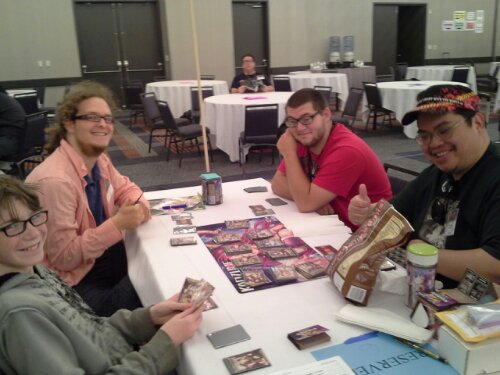 My impression of Kanzume Goddess’s cards being hard to read was backed up in play– my players had a hell of a time reading them, even in the well-lit game room (as opposed to my living room, where I’ve usually squinted at the cards trying to read them at home). Our winner for the game was Poseidon, followed by Loki, but everyone had a terrific time playing, including the younger player, who is “crazy about Greek mythology” and really got into it. He also loved the promo cards that Japanime Games had sent me to hand out to the players.
My impression of Kanzume Goddess’s cards being hard to read was backed up in play– my players had a hell of a time reading them, even in the well-lit game room (as opposed to my living room, where I’ve usually squinted at the cards trying to read them at home). Our winner for the game was Poseidon, followed by Loki, but everyone had a terrific time playing, including the younger player, who is “crazy about Greek mythology” and really got into it. He also loved the promo cards that Japanime Games had sent me to hand out to the players.
We did, however, need to reference the (incredibly hard to read) rulebook a few times, especially because I haven’t played the game enough to know them forwards and backwards yet. The rules are not too obscure. But they are, again, printed in very small font.
![]() Mike and I hopped into a Stones of Fate game on Monday morning. This is a game that uses Tarot cards as playing cards and is something of a memory matching game. It’s fun, though we did have a non-spatially-oriented player who had a rougher time with it. People who play Set and Memory will do well with it.
Mike and I hopped into a Stones of Fate game on Monday morning. This is a game that uses Tarot cards as playing cards and is something of a memory matching game. It’s fun, though we did have a non-spatially-oriented player who had a rougher time with it. People who play Set and Memory will do well with it.
The game was being demo’ed by Jeff Cornelius of Cosmic Wombat games, and it has a Kickstarter project going right now. For $20, it’s definitely worth backing– we had a good time playing it, although we were all so very serious (probably because it was Monday morning at 9 AM after a long convention!)
 Although it wasn’t the last game we played (that would be Stones of Fate), the last RPG we played and which had us talking in the car on the way home, is called Our Last Best Hope. It’s an RPG where you play a crack team, the only hope Earth/humanity has against The Crisis. It’s a GM-less game, so the players come up with the crisis and the plan together, then make characters who are, in many ways, completely dysfunctional human beings. Think of the movie Armageddon. It’s like that, and every other B-grade sci fi and horror movie about saving the world.
Although it wasn’t the last game we played (that would be Stones of Fate), the last RPG we played and which had us talking in the car on the way home, is called Our Last Best Hope. It’s an RPG where you play a crack team, the only hope Earth/humanity has against The Crisis. It’s a GM-less game, so the players come up with the crisis and the plan together, then make characters who are, in many ways, completely dysfunctional human beings. Think of the movie Armageddon. It’s like that, and every other B-grade sci fi and horror movie about saving the world.
It was awesome and fun, and I bought the book even before playing, because it sounded so cool. I’ll probably schedule a game for the Sunday RPG group in a few weeks.
